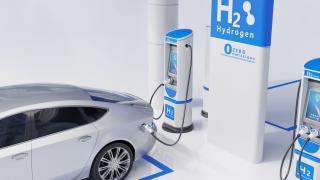
As a society, we know we need to be doing more to protect the environment and reduce our carbon footprint. From large businesses down to SMEs and even as individuals, we are all responsible for changing our habits for the greater good of the planet and generations to come. With global warming becoming more and more of a pressing issue, our infrastructure needs to be moulded to suit the resolution instead of the cause.
As transport is a huge contributor towards greenhouse gas emissions, it's comforting to know that more environmentally-friendly options are becoming readily available. Within the UK, the sale of new petrol and diesel vehicles will be banned from 2030, bringing to an end our reliance on fossil fuels. Electric cars have made huge headway in becoming the alternative of choice, but could hydrogen-powered cars become a more preferable option?
The Quest For Electric:
As hybrid cars and vehicles have been on the market for quite some time, it makes sense that electric was our first port of call when it came to finding a replacement fuel source with less environmental impact. Indeed, electric vehicles are fast becoming a staple in the automotive industry ahead of 2030's ban on new petrol and diesel car sales, as automotive manufacturers look to keep up with emerging trends and offer future-proof solutions.
The main disadvantage of electric vehicles is the time it takes for cars to recharge.
Electric vehicles are without a doubt more eco-friendly than their petrol and diesel counterparts, but they also offer a whole other range of benefits. With the need for fuel eliminated, drivers can often experience better mileage in an electric car compared to a petrol vehicle, as well as a smoother, quieter driving experience overall. However, that's not to say that electric vehicles are without fault. The main disadvantage that drivers of electric vehicles face is the time it takes for their cars to recharge. Whilst filling up with petrol or diesel takes only minutes, it can sometimes take hours for an electric vehicle to fully recharge, which isn't exactly ideal if you're in the middle of a journey or if you're up against the clock. Due to this, electric vehicle owners have to plan their trips in accordance with the vehicle's range, which can sometimes fall much shorter in the real world than the figures advertised by the manufacturer.
Although this is an area which will be continually developed as the purchase and use of electric cars becomes more prominent, it's easy to see why some people are reluctant to jump on the bandwagon. Until fast charging affords drivers a more efficient wait time, it is likely that the sale of electric vehicles will plateau between now and 2030. Perhaps we should be using this interim period to also explore other possible alternatives to the use of fossil fuels, which is where the introduction of hydrogen-powered vehicles could potentially become a game changer.
READ: Is the UK's Automotive Industry Under Threat?
The Case For Hydrogen:
Hydrogen is currently being explored as a viable alternative fuel source to kerosene, which would revolutionise the aviation industry and reduce emissions to zero. However, the use of hydrogen to power vehicles is not limited to air travel - road-based vehicles could also be a potential area of development for the use of hydrogen fuel.
In comparison to all other fuel sources - including electricity - hydrogen produces the least emissions.
The use of hydrogen as a fuel source is not new, but it is yet to gain momentum as a mainstream concept. With the issues of climate change becoming ever more prominent, however, the time could be nigh to push the button on the development of hydrogen fuel cells for widespread use.
Why hydrogen? Well, in comparison to all other fuel sources - including electricity - hydrogen produces the least emissions, which would make hydrogen-powered cars even more eco-friendly than electric vehicles. In fact, the only emission produced by hydrogen-powered vehicles is H2O - otherwise known as plain old water.
Refuelling could stay in line with the more traditional pump-operated methods that we use today.
As an element, hydrogen is also extremely abundant, which means that as a society, we would not face impending shortages as seen with the use of fossil fuels. From a driver's perspective, the use of hydrogen fuel also bypasses the headache of lengthy charging times, meaning that refuelling could stay in line with the more traditional - and ultimately much more efficient - pump-operated methods that we use today.
Believe it or not, hydrogen-powered vehicles are technically electric vehicles - it is just that the electricity itself is generated by the hydrogen, as opposed to having to be plugged in to recharge. Therefore, there is plenty of potential for hybrid electric-hydrogen vehicles to make their way onto the market within the coming years as this technology continues to be developed.
READ: Is Hydrogen the Answer to Zero-Emissions Air Travel?
Why Isn't Hydrogen a More Prominent Fuel Source?
All of this begs the question as to why hydrogen isn't more prominently used if it solves the emissions problem and allows drivers to refuel quickly and simply. The simple answer is that we currently lack the infrastructure to support the use of hydrogen-powered vehicles on our roads. Petrol stations do not currently offer the option to dispense hydrogen fuel, which inhibits the sale and purchase of hydrogen-powered vehicles for widespread use.
We currently lack the infrastructure to support the use of hydrogen-powered vehicles on our roads.
However, it was only a few short years ago that charging points for electric vehicles were scarce, so it is likely that the use of hydrogen-powered cars will rise in accordance with our infrastructure and the public availability of hydrogen fuel. It becomes a bit of a chicken-and-egg scenario to consider, but with the right development, this solution could certainly become just as - if not more - prominent than electric vehicles, especially as we strive for zero emissions and less environmental impact.
With major automotive manufacturers now looking at hydrogen seriously, it surely will not be long before hydrogen-powered vehicles make their way onto the market. After all, as an even greener alternative to electricity, hydrogen fuel has the power to benefit both drivers and the planet alike.
